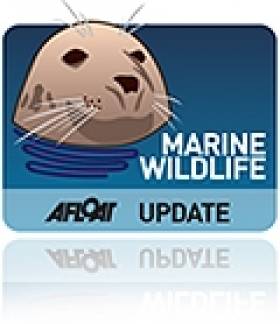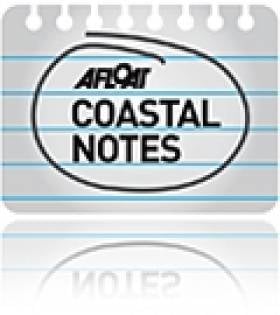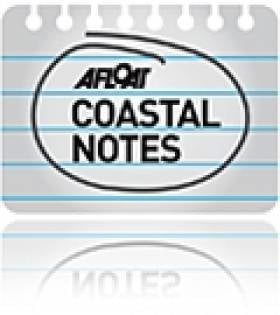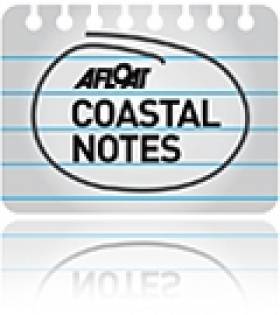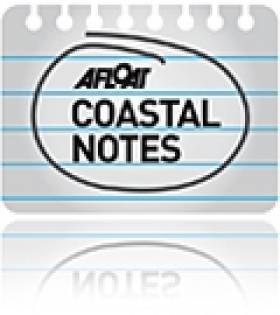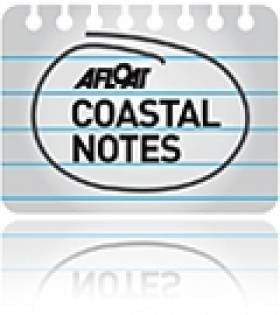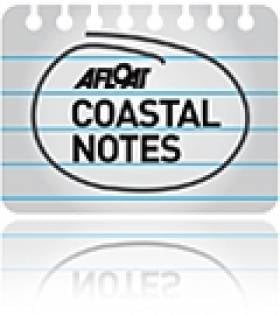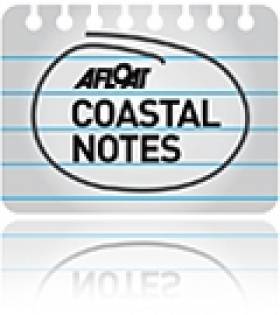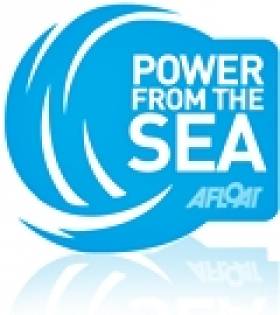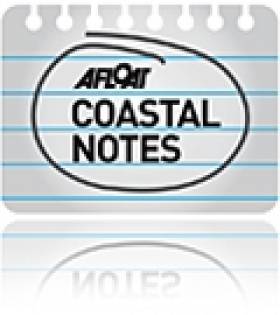Displaying items by tag: Kish Bank Basin
Concern Over Impact of Seismic Survey on Dublin Bay Porpoises
#PORPOISES - The Irish Whale and Dolphin Group (IWDG) has expressed concern over the potential impact of a 2D seismic survey on harbour porpoises in Dublin Bay.
As recently reported on Afloat.ie, Providence Resources has been granted a foreshore license for the Dalkey Island Prospect in the Kish Bank Basin to allow for a well site survey, and exploration well and a seismic survey.
But the IWDG has written to Minister of State Jan O'Sullivan suggesting that he Environmental Risk Assessment (ERA) conducted on the area is deficient.
The group argues that the ERA has not assessed the footprint of the seismic survey, saying the mitigation proposed is inadequate and that the disturbance and impact to cetaceans – especially harbour porpoise – is "potentially significant and in contravention of national legislation and EU Directives".
Moreover, the IWDG claims that an Environmental Impact Assessment (EIA) of the effect of a seismic survey on harbour porpoise "doesn’t seem to have been carried out".
The harbour porpoise, which is an Annex II species, is entitled to strict protection. The species has been recorded at very high densities in Dublin Bay during surveys carried out by the IWDG in 2008 on behalf of the National Parks and Wildlife Service (NPWS).
The group says that impact monitoring is needed to gather data on the effects of seismic surveys on harbour porpoises, and recommends it as an additional condition on the license.
"Compliance with the NPWS guidelines does not constitute monitoring and as porpoises are elusive and spend 95% of their time underwater and are difficult to see in a sea state greater than Force 1, the guidelines do not serve to protect them once the works are on-going.
"In addition there are specific data required on their site usage prior to the works and a monitoring plan to assess how they recover after the works."
Moreover, the IWDG claims that in this instance the NPWS "are negligent, as they are not providing strict protection to an Annex II species."
Earlier this year Environment Minister Phil Hogan rejected a call from Tánaiste Eamon Gilmore and others for a public enquiry into the Dalkey Island foreshore licence.
Dolphin Group Comments on Dalkey Island Prospect
#DALKEY ISLAND PROSPECT - The Irish Whale and Dolphin Group (IWDG) has joined the chorus of opposition to the proposed oil and gas exploration off Dalkey Island in Co Dublin.
As previously reported on Afloat.ie, Providence Resources has applied for a foreshore licence to search for oil or gas about 6km out to sea on the Kish Bank Basin.
But the prospect has provoked a split in the local community over the potential risks and benefits, with many calling for a public enquiry into the licence before it is granted.
This evening an urgent meeting in Dun Laoghaire will address the public's concerns, which have been echoed by the IWDG.
"The Kish Bank and adjacent waters are important for cetaceans," said the group in a statement. "In addition, sightings of bottlenose dolphins have increased dramatically in the area following the presence of a group of three individuals since August 2010."
The IWDG is concerned about the potential effects on dolphins and porpoises that "could due to noise generated from the drilling process", noting that "there is little published data on the intensity and effects of sound generated by drilling".
Protest group Protect Our Coast has launched a online petition against the Dalkey Island Prospect citing concerns over the proximity of the drilling area to the mainland as well as the Special Protection Area of Dalkey Island, which is a haven for marine wildlife.
- Irish Whale and Dolphin Group
- IWDG
- Dalkey Island Prospect
- Coastal Notes
- Dalkey Island
- Dublin
- oil and gas
- exploration
- drilling
- Providence Resources
- foreshore licence
- Kish Bank Basin
- community
- Dun Laoghaire
- bottlenose dolphins
- Porpoises
- Cetaceans
- noise
- sound
- Protect Our Coast
- protest
- petition
- Special Protection Area
- marine wildlife
Community May Split Over Application for ‘Dalkey Island’ Prospect
#DALKEY ISLAND PROSPECT -With only days left until the public consultation closes on an application for oil and gas exploration off Dalkey Island, Co. Dublin, locals are grappling with the potential risks and benefits of such a development following last Tuesday's community meeting held in the south-side suburb.
Providence Resources has applied for a foreshore licence to search for oil or gas about 6km out to sea off Dalkey Island on the Kish Bank Basin. The licence would involve a two-week seismic survey and subsequent drilling of a single exploration well over one or two months. The company said it was at a "relatively early stage" and if oil or gas were discovered it would need further licencing.
Of the 300 capacity audience that attended the evening meeting in Dalkey Town Hall, the vast majority including Tánaiste Eamon Gilmore, supported a call for a public inquiry into the licence before it is granted.
Architect Bill Hastings, who chaired the information meeting, was concerned that locally the issue could divide the community and many people pointed out that "it was not just a Dalkey issue but one for all of Dublin Bay". To read more on a report in today's The Irish Times click HERE.
#DALKEY ISLAND PROSPECT- At a public meeting held by Dalkey Community Council last night, it was almost unanimously agreed that a public enquiry should be held over the foreshore licence sought by Providence Resources to carry out exploratory drilling for oil and gas, in the Kish Bank basin, some 6kms off Dalkey Island, writes Jehan Ashmore.
Over 200 residents attended the meeting in Dalkey Town Hall where they heard Tanaiste Eamon Gilmore and Dun Laoghaire-Rathdown County Councillors deal with the issues raised over the proposed seismic survey and exploratory well drill. Among the major issues was the project's proximity to the populated coastline and its special areas of conservation. It was pointed out that Norwegian drilling operations took place at least 25km offshore.
Mr. Gilmore said the fisheries conservation order in which he was engaged with during his role as Minister of State for Marine would form part of his personal submission to the Department of the Environment. When questioned from the floor if he would make his submission public, he said that for transparency he would do so "reflecting concerns of his constituents".
Providence Resources were invited to attend the meeting, but they declined on grounds of the size of the meeting, though small groups can discuss the exploratory drilling of the 'Dalkey Island' prospect at their Donnybrook headquarters.
The company have said that the work they want to do is purely exploratory and relatively low-key and that it can be undertaken unnoticed, with no adverse environmental effects.
Tom Kivlehan of the Green Party, who had last week called on Minister of the Environment Phil Hogan to establish a public enquiry, said: "There are huge concerns among the people of Dublin about the proposed application and they feel that the process does not afford them the opportunity to have their questions and worries answered."
Mr Kivlehan emphasised, however, that the risks and benefits must be balanced. This point was also made by former Green Party T.D. Ciaran Cuffe who said that while untold damage could be done, "we must evaluate everything very carefully."
People Before Profit T.D. Richard Boyd Barrett said he was "absolutely opposed" to the proposal and the impact it would have on Dublin Bay as an amenity and to tourism. He called at the very least for a public enquiry to be carried out before a decision on granting the licence is made and claimed that there were no guarantees that any oil would be discovered or the potential financial benefits of a find would go to the Irish people.
- Dublin Bay
- dlrcoco
- Green Party
- Dalkey Island
- Providence Resources
- Kish Bank Basin
- Dalkey Island Prospect
- Dun LaoghaireRathdown County Council
- Coastal Notes
- Dalkey Community Council
- Foreshore License
- Department of Environment
- Tanaiste Eamon Gilmore
- Dalkey Town Hall
- Exploratory Drilling
- Public Enquiry
- Minister Hogan
#DALKEY ISLAND PROSPECT – The Green Party has called on the Minister for the Environment ,Phil Hogan, to hold a public enquiry in to the application to grant a license to Providence Resources' PLC to carry out a site survey and drill an exploration well in the Dalkey Island prospect on the Kish Bank basin.
Speaking yesterday Green Party spokesperson on Planning, Tom Kivlehan, said: "There are huge concerns among the people of Dublin about the proposed application and they feel that the process does not afford them the opportunity to have their questions and worries answered.
A public enquiry could address their fears. We have seen the consequences of poor public consultation in respect of the Corrib Gas Field and we should learn the lessons from it".
Dublin Bay is an environmentally sensitive area and a tremendous amenity for the population of Dublin, Famous for its Dublin bay prawns, it has a special area of conservation, bird sanctuaries, seal and dolphin populations, fishing grounds, beaches and sailing facilities.
He added: "It also is home to Ireland's largest port and is a busy shipping hub. Any new proposed development that can cause a potential risk to the life of Dublin Bay must be open public scrutiny and be fully transparent".
Under the Foreshore Act 1933 (Section 3, paragraph 9) the Minister has the power to call a public inquiry and "we now ask him on behalf of the people of Dublin to do so as quickly as possible".
As previously reported on Afloat.ie, a public meeting is to be held by Dalkey Community Council next week to discuss the proposed exploratory operation by Providence Resources.
- Green Party
- Coastal Notes
- Dalkey Island Prospect
- Kish Bank Basin
- Providence Resources
- Minister Phil Hogan
- Department of Environment
- Dublin Bay
- Dublin Bay Oil exploration
- Dalkey Community Council
- Corrib Gas field
- Bird Santuaries
- Seal and dolphins
- fishing grounds
- beaches
- Dublin Bay prawns
- Dublin Port
- Dublin port shipping hub
Dalkey Meeting to Discuss Proposed Oil Drilling
#'DALKEY ISLAND' PROSPECT – In response to a proposed exploratory search for oil and gas operation by Providence Resources off Dalkey Island, Co. Dublin, as previously reported on Afloat.ie, a public meeting is to be held by Dalkey Community Council next week, writes Jehan Ashmore.
The meeting to be held next Tuesday in Dalkey Town Hall (at 7.30 p.m.) is to discuss the Providence venture, named 'Dalkey Island' prospect, in reference to the island off the south-side suburb. The island and the coast along Dalkey is geographically the nearest landfall to where the proposed 'jack-up' drill rig would operate in block (33/21) in the Kish Bank Basin.
An online petition (see www.protectourcoast.net) by campaigners, entitled 'Protect Dublin Bay, Dalkey Island and Killiney Bay from Large Oil Drill 2012', has already gained large support, including signatures from overseas. They are in protest over Providence Resources application for a foreshore license which has been lodged with the Department of Environment.
Providence Resources propose to drill a single borehole for the exploratory well which is likely to be in an area only 6kms offshore of the Dalkey coastline. The island is designated a Special Protection Area (SPA) and notably where there have been sightings of bottlenose dolphins in neighbouring Killiney Bay.
Should the oil be commercially viable, the benefits of becoming self-sufficient and security of supply would be of significant economic benefit to Ireland. To date 100% of the country's oil and 95% of its gas is currently imported, and yet most of Ireland's natural resources are unexplored, according to Providence Resources.
Exploration is an expensive exercise and has no guarantee of discovery while the timeframe from discovery to production can typically take five to seven years.
"Yet," say Providence Resources, "the implications of discovering and utilising such a natural resource, and potentially becoming self-sufficient in energy terms, would be of significant economic benefit for Ireland Inc. in terms of taxation, employment, security of supply and skills development."
To read more information about Dalkey Island Prospect from Providence Resources, with maps, montages (including views from White Rock Beach) newsletters and video presentation visit www.providenceresources.com/dalkeyisland.aspx
- Dublin Bay
- bottlenose dolphins
- dalkey
- Dalkey Island
- Providence Resources
- Kish Bank Basin
- Coastal Notes
- Killiney Bay
- Special Protection Area
- Dalkey Community Council
- Foreshore License
- SPA
- 'Dalkey Island' prospect
- Coastal note news
- Department of Environment
- ProtectOurCoast
- Protect Dublin Bay,Dalkey Island and Killiney Bay from Large Oil Dril 2012
Campaign to Stop Planned Oil Drill off Dalkey Island
#DALKEY ISLAND PROSPECT - An online petition organised by Protect Our Coast in protest over plans by Providence Resources to start exploratory drilling for oil and gas off Dalkey Island, in south Co. Dublin, has reached over 2,000 signatures to date, including support from overseas.
Providence Resources are seeking permission from the Department of Environment for a foreshore licence to carry out site investigation and drill testing in waters depths of 20-30m in the Kish Bank Basin, at the Dalkey Island 'Prospect'.
They propose drilling one exploratory well some 6kms offshore, though the exact location chosen for the well site is subject to results of seismic surveys. This particularly area lies closer to the coastline, as it is on the more westerly fringes of the exploratory block (33-21) zone.
The campaigners object to the proximity of the well site off Dalkey Island which is designated a Special Protection Area (SPA). The island is home to a resident herd of goats, is rich in birdlife, seals and cetaceans, notably bottlenose dolphins in neighbouring Killiney Bay, which have drawn recent media attention and aided the objectives of the campaign, see www.protectourcoast.net
In addition they oppose the drilling location given its closeness to a large urban population and the risk of an oil-spill and consequent effects to humans and the environment throughout Dublin Bay.
If granted, exploratory work is due to start this year, with Providence claiming the entire process would take up to six months, between survey and drilling operations. During part of that timeframe, up to two seismic vessels will be employed, prior to deploying a 'jack-up' rig to the well site.
Should the oil be commercially viable, the benefits of becoming self-sufficient and security of supply would be of significant economic benefit to Ireland. To date 100% of the country's oil and 95% of its gas is currently imported, and yet most of Ireland's natural resources are unexplored, according to Providence Resources.
Exploration is an expensive exercise and has no guarantee of discovery while the timeframe from discovery to production can typically take five to seven years.
"Yet," say Providence Resources, "the implications of discovering and utilising such a natural resource, and potentially becoming self-sufficient in energy terms, would be of significant economic benefit for Ireland Inc. in terms of taxation, employment, security of supply and skills development."
To read more information about Dalkey Island Prospect from Providence Resources, with maps, montages (including views from White Rock Beach) newsletters and video presentation visit www.providenceresources.com/dalkeyisland.aspx
As previously reported on Afloat.ie, the application for the foreshore license is currently on view in Dalkey and Dun Laoghaire Garda stations. The application contains maps, plans, and drawings which can be inspected, noting the public consultation process ends on Thursday 2nd February 2012.
In addition for information from the Department of Environment's website, click HERE. Those wishing to make an objection or representation of the sought license should make submissions to the Foreshore Unit of the department on close of business (also) on Thursday 2nd February 2012.
.
- Dalkey Island Prospect
- Dublin Bay News
- Providence Resources
- Protect Our Coast
- Dublin Bay Oil drilling
- Killiney Bay
- Dalkey Island
- Dalkey Island Goats
- Dalkey Dolphins
- Department of the Environment
- Foreshore License
- White Rock Beach
- Killiney Beach
- Kish Bank Basin
- Special Protection Area
- SPA
- JackUp rig
- seismic survey
- Irish economy
- Online petition
- Well Site
- Exploratory Well Kish Bank Basin
- Cetaceans
- bottlenose dolphins
Display of Oil Exploration Plans for Dalkey Island Prospect
#DALKEY ISLAND PROSPECT – Plans by Providence Resources to search for oil and gas off Dublin and Wicklow coastlines, along the Kish Bank Basin are currently on display in Dalkey and Dun Laoghaire Garda Stations.
An application for a foreshore license was lodged by Providence Resources to the Department of Communications, Energy and Natural Resources.
The company seek to undertake a site investigate including the drilling of an exploratory well - which is known as the Dalkey Island prospect located 10km offshore.
Providence hope to ascertain if oil or gas, are present and that quantities are commercially viable for the company that holds a 50% interest in the licence and operates on behalf of Star Energy.
A copy of the application, and the relevant maps, plans, and drawings, are available for inspection at both Garda stations (see addresses below). The public consultation process of 21 days started on 5th January and the closing date is Thursday 2nd February 2012.
Dalkey Garda Station, Tubbermore Road, Dalkey, Co. Dublin and Dun Laoghaire Garda Station, 33/34 Corrig Avenue, Dun Laoghaire, Co. Dublin.
In addition documentation is also available to view at the department's website by clicking HERE.
Oil and Gas Firm Issued Licence to Explore Off Dalkey Island
#POWER FROM THE SEA - Irish oil and gas firm Providence Resources has been awarded a licence to explore near Dalkey Island, the Irish Independent reports.
The standard licence issued by the Department of Communications, Energy and Natural Resources lasts for up to six years, split into two three-year phases.
Providence hopes to drill at least one well during the initial phase in the Kish Bank Basin, where previous exploration drilling confirmed the presence of oil suitable for petroleum production.
The group is also applying for a foreshore licence for the purpose of well site surveys and drilling operations.
As previously reported on Afloat.ie, Providence Resources is one of the 12 companies that were awarded 13 Licensing Options between them in the 2011 Atlantic Margin Licensing Round.
The Irish Independent has more on the story HERE.
Potential Oil-Field off Dalkey
"It's another evaluation process which is positive, an encouraging tick in the box. But ultimately it's only exploration-it has to be drilled", said Tony O'Reilly, CEO of Providence. "I'm hoping that'll be 2011, as part of our overall multi-basin programme in Ireland. We've a big programme of activity and the Dalkey Island (Prospect) will be part of that", he added.
The advantage of any potential oil find at the Dalkey Prospect is that the block well is in shallow waters up to 25-metres, compared to Providence deeper offshore projects of Dunquin and Spanish Point. Another factor in drilling off Dublin Bay is that operations are cheaper and safer. The naming of the exploration site after Dalkey, reflects the Kish Basin's relative geographical proximity to that particular stretch of coastline, marking the southern approaches to Dublin Port.
The optimism expressed about the Kish Bank Basin exploration and other fields must be put into context based on the previous track record of drilling around the Irish coast. The Irish Offshore Operators'Association (IOAA) has pointed out that the exploration industry has spent some €3 billion on around 130 drill-well testing sites since 1970, to little effect. The cost of a well operation off the west coast is over €50m and with such high investment, only up to two wells are carried out annually. Of the commercially viable wells, just four-fields have been exploited, but all are gas-based.
The IOAA says that there is potential but there needs to be more exploration activity. In 2009, only two bids for exploration licences were made, compared to 350 offers sought in UK waters. The association blames the lack of exploration due to delays experienced at the Corrib field, an absence of infrastructural development and expensive operating costs.
The association says the rewards are great, citing the Department of Energy's estimate of recoverable reserves of 10 billion barrels of oil. At that amount, the figure is 100 times the state's annual energy consumption of both oil and gas.


























